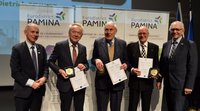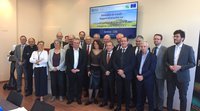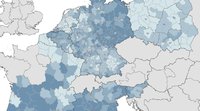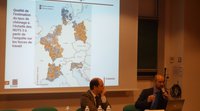TERRITORIES
Annual seminar of Greater Region EURES advisers
January 2019On 7 December 2018 in Metz, the EURES Resource and Documentation Centre/Grand Est Cross-Border Workers hosted the annual seminar of EURES advisers in the Greater Region.

On 7 December 2018 in Metz, the EURES Resource and Documentation Centre/Grand Est Cross-Border Workers hosted the annual seminar of EURES advisers in the Greater Region.

It was in the Alsatian town of Wissembourg that, on 12 December 2018, the 30th anniversary of the declaration of intent that established the PAMINA Eurodistrict was celebrated.

A seminar on the fair distribution of taxes and social security contributions in cross-border areas was held on 25 October in Geneva by the FEDRE Foundation and the Council of Europe’s Congress of Local and Regional Authorities.

On 29 May 2018, the European Commission published five proposals concerning the future 2021-2027 cohesion policy, of which two directly concern cross-border matters: the European Territorial Cooperation (Interreg) Regulation and a new Regulation creating a “mechanism to resolve legal and administrative obstacles in a cross-border context” (ECBM).

At once a Caribbean island, an overseas collectivity of the French Republic and an Outermost Region (OR) of the European Union, the Collectivity of Saint Martin has resolutely placed regional integration at the heart of its development strategy.

The characteristics, both geographic and political, of our territory justify the necessity for strengthened cooperation. The Collectivity of Saint Martin’s ambition is that, through strengthened regional cooperation, our territories become examples in the sectors where they possess “added value”, in developing, for example, infrastructure, Research and Development (R&D) notably in terms of the circular economy, the blue economy, sustainable agriculture, renewable energies, digital technologies, and earthquake-resistant and hurricane-resistant materials...

The European Entrepreneurial Region Award rewards EU regions showing excellence and innovation in strategy on entrepreneurial policy. It is open “to all EU territories of Member States, including communities and city's as well as cross-border territories with legal personality such as EGTCs and Euroregions”.

Following the Communication “Boosting growth and cohesion in EU border regions”, DG REGIO launched a pilot project focusing on the collection and availability of data necessary for studying cross-border territories. The study, carried out by eight national statistical institutes, including the French INSEE, has just been published. It focuses on indicators for analysis of the labour market. The results are promising and invite further research.
The members of the Working Community of the Pyrenees have formalised an innovative new instrument for cross-border cooperation and development, named “Pyrenean Strategy”. Its priorities include the preservation of the Pyrenees’ biodiversity, the adaptation of territories to global warming, combating desertification, and access to mobility.

The MOT, and the Jacques Delors Institute have in a 50-page document compiled a summary of the five cross-border citizen consultations that they held with local partners.

The Assembly of French Departments (ADF) has published an atlas of departments’ European and international cooperation actions. It notably details the collaborations pertaining to cross-border cooperation. The publication was realised in partnership with the Delegation for External Action of Territorial Authorities of the French Ministry for Europe and International Affairs, and the Banque des Territoires.

The CGET and the “Régions de France” association held, with the Bourgogne-Franche-Comté Regional Council, a national seminar on European Territorial Cooperation (ETC), on 4 December in Besançon. It brought together around a hundred participants and enabled clarification of the stakes of the negotiation, while reaffirming a strong French ambition, shared by both the French State and the Regions.

On 21 November 2018, the MOT network gathered for a day of discussions in Paris on the premises of the CGET. The steering committee and the board were presided over by the new president of the MOT, Robert Herrmann, president of the Strasbourg Eurométropole.

On the occasion of the French president Emmanuel Macron’s visit to Belgium on 18 and 19 November, a declaration of intent on strengthening cooperation in matters of cross-border mobility and transport was signed by the two countries:

Documentary by Simon Brunel and Nicolas Pannetier, 53 min, broadcast on Arte on 16 November 2018 at 10:20am.

At the Council of Ministers on 7 November 2018, the Minister for Territorial Cohesion presented a communication on France’s territories that sets out the Government’s objectives with respect to them. This document points out that in order to “identify each territory’s potential” it will be necessary to “build a ‘bespoke’ relationship with the players in that territory”.

In a new call for proposals, the European Commission is allocating €30 million to the European universities project: a major step towards higher education without borders.

The French government has announced its support for the creation of a European territorial authority of Alsace, formed by the merger of the Bas-Rhin and Haut-Rhin Departments. It will be set up as of 1 January 2021. “We will support the elected representatives in their desire for Alsace. This will all be within the Grand Est Region – not a special status, but an authority with particular competences that derive notably from the cross-border setting and Alsace’s Rhineland identity,” stated the Minister for Territorial Cohesion, Jacqueline Gourault.

This eighth edition, which runs to 160 pages, is aimed at French cross-border workers who work in Luxembourg. It gives an overview of the legislation in force, setting out the principal rules to which these workers are subject in the areas of labour law, social security and tax law.

Citizens turned out for the citizens’ consultation held on 27 October by the Lille-Kortrijk-Tournai Eurometropolis, the MOT and the Jacques Delors Institute. This was a thoroughly European story.

This new platform of the Lille-Kortrijk-Tournai Eurometropolis is aimed at developers of cross-border projects who wish to raise their profile, to find partners on the other side of the border, or who require assistance in implementing their project.

What European tools should be used to step up the energy transition? And what policies should be adopted to foster mobility among young people and learning the language of the neighbouring country’s? In Haguenau on 25 October, the citizens’ consultation organised with the MOT and the Jacques Delors Institute in the PAMINA Eurodistrict, with the support of Vincent Thiébaut, MP for the Bas-Rhin Department, brought together a hundred or so citizens to discuss the actions they would like Europe to implement in the cross-border setting.

A brochure published by the European Committee of the Regions presents examples of good practices by EGTCs across Europe.

The proceedings of the seminar on "Territorial observation and assistance with decision-making in cross-border regions" hosted by the MOT and UMS RIATE (Interdisciplinary network for territorial development and cohesion in Europe and neighbouring countries) on 17 September in Paris are online, together with all of the presentations made at the seminar.

On 22-26 October, the MOT coordinated and accompanied the study visit of a delegation made up of representatives of ministries and local authorities from Haiti and the Dominican Republic.